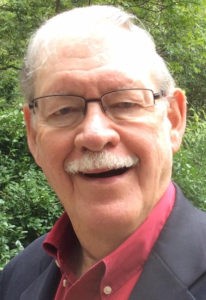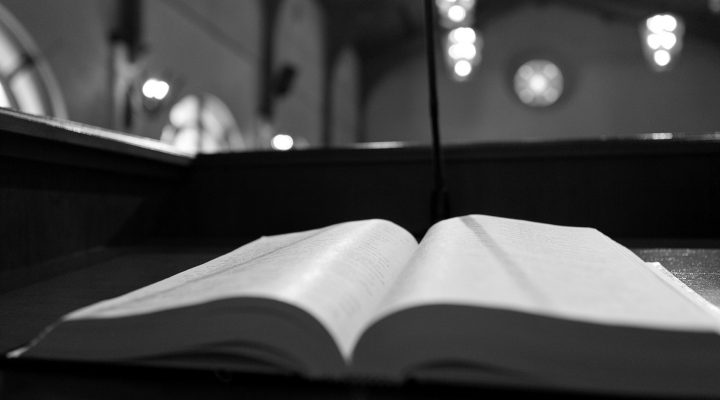Floyd Craig started making a difference in my life before I knew who he was.
I was a senior in college in 1968, a ministerial student serving a small rural church in Middle Georgia. Most of my church members lived on farms that had been a part of the plantations of their slave-holding ancestors. Most of their farmhands were the descendants of the slaves who had been owned by those ancestors.
The Civil Rights Movement was roiling. The racial attitudes in the church were not what anyone would call progressive. One woman in the church said to me, “I don’t know how you feel about all this racial trouble. I know a lot of preachers don’t feel like people do about it.”

David Sapp
And then a packet came in the mail announcing the coming of Race Relations Sunday to Southern Baptist churches everywhere. The packet contained magnificent materials: background pieces, visuals, posters — most of it designed by Floyd Craig.
Mercer University had awakened in me a newfound sensitivity to the plight of my Black brothers and sisters, and I was wondering how in the world I could preach the gospel I was coming to understand in my little church whose people I loved so much and do until this day. That packet was my answer. These materials were so good I thought I could use them and possibly survive.
And so, inspired by Floyd, although I did not yet know his name, I took to the pulpit on Race Relations Sunday, took a deep breath, marshalled my courage, and set out with imagined prophetic prowess to scorch the earth.
“God has commanded us,” I thundered, and then fading to a quivering whisper, I said, “to love everyone.” Then I stopped, too afraid to say more.
“I took to the pulpit on Race Relations Sunday, took a deep breath, marshalled my courage, and set out with imagined prophetic prowess to scorch the earth.”
No one reacted to the sermon, but I went back to my dorm that night with my cowardice ever before me. It judged me harshly. I had stepped up to a prophetic moment but backed away. I had tried to thunder but had only squeaked. I had tried to roar but had only whimpered. In fact, I had whimpered so softly that I wasn’t sure anyone heard me at all.
But then a few months later I left to go to seminary. On my last Sunday at that church, in a moment with some of the congregation, a church member said to me: “You’ve been a great pastor. There’s only one thing you ever said that I disagreed with. It was the Sunday you told us we had to love the” … well, you can insert the n word for yourself.
And there it was. The cold, hard evidence. I had spoken too meekly, but he had heard me anyway. And if he heard me, so did his children. So did his nieces and nephews. So did his grandchildren and his neighbors. God sometimes speaks even when his messenger only squeaks.

Floyd Craig
And this messenger squeaked only because he was nudged, equipped and inspired to speak by the much greater courage of Floyd Allen Craig. No one knows how many other pastors there were whom Floyd influenced in the same way.
Next, a series of pamphlets appeared called “Issues and Answers.” For the first time, I saw something produced by Baptists that was truly impressive — visually beautiful, prophetically powerful, creatively rare. They were for me, the first glimmer of what I hoped would be a new day in Baptist life.
In later years, Floyd told me stories of the creative processes involved in the photography shoots for so many of those “Issues and Answers” covers. All I know is that the result of that creative process was a powerful reminder that Jesus is to be taken seriously. That is why, when my own chance to work for the Christian Life Commission came, I knew I wanted to work with the likes of Floyd Craig.
Floyd was a visionary. He could see things in a way most of us couldn’t, at least until he told us what he saw. That vision was God’s gift to him, and through him to us.
For instance, in a chapel address at Oklahoma Baptist University many years ago, Floyd suggested if we really wanted to understand the scandal of the Cross, then instead of wearing silver and gold crosses around our necks, we might do better to wear little electric chairs. Somebody wrote a news story about it, and of course the fundamentalists, with their literalist little minds, went into their predictable apoplexy.
“We’re saved by the blood of Jesus,” they said, “and no blood is shed in an electric chair. We’ve got heresy, right here in River City!” What incisive intellect.
But countless others, including many of the students who heard him that day, were able to see the scandal of the Cross for the first time. They saw it because Floyd saw it.
David Sapp is a retired pastor of Baptist churches in Georgia and Virginia who now lives in Atlanta.
Related article:
Remembering Floyd Craig, The Godfather of Baptist communicators | Opinion by Larry Brumley


